The airstrikes after Douma will make no difference – Assad and his Russian backers have already won the war
Twice as many missiles were fired after the attack in Douma than in the Khan Shaykhun strikes of last year. But just how much damage was done is a matter of dispute

The graves were red mounds of earth, run into each other by wind and the rain. There was a freshly dug set, one of them no more than four feet long. It was of a little girl called Hania, the youngest of a family of five who were the most recent to die in the village.
None of them were killed by chemical weapons. The deaths had been delivered by conventional weapons: missiles, fired from a Syrian regime warplane – a fairly regular occurrence in the area at the time, adding to the lethal toll of 100,000 in the uprising which had lasted for two and half years at the time.
This was in September 2013, in Aleppo Province on the eve of American airstrikes, due to come after Bashar al-Assad had crossed Barack Obama’s red line by carrying out a chemical attack on Ghouta.
“The Americans are going to bomb now because of Ghouta? What about the thousands that Bashar had been killing, my family, so many other families gone?” asked 74-year-old Abdurahman al-Shibi, Hania’s grandfather, as he placed wildflowers on the graves.
But he was glad something was being done at last. “They going to do something to really help us now, America, Europe. I really hope they do.”
The expectation of the raids led to high excitement among opposition activists and rebel fighters. The moderates among them (there were still quite a few left at the time) believed that the West had seen the error of abandoning them, and a counter-offensive could be launched not just against the regime, but the extremists of Jabhat al-Nusra and the newly arrived Isis who were taking over their revolution.
I recall Jamal Shamoun, a young commander talking about how the regime would be forced to stop its barrel bombing; foreign jihadists would be chased out and a settlement reached among Syrians. He would be able to return to his former life of an engineer in Aleppo. “I can go back to building things again, instead of destroying them,” he reflected.
I tried to warn against raising expectations – the airstrikes were unlikely to be followed by anything much else. But people were convinced there would be real Western commitment changing the tide of the conflict.
At the end, of course, there were no Western airstrikes. The Obama administration, which had been uneasy about embarking on it, eagerly seized on a Russian guarantee that Bashar al-Assad would dispose of his chemical arsenal.
David Cameron, meanwhile, had lost the Commons vote to authorise military action. The French, who had been as vocal about the need to bomb as they have been this time after the Douma attack, prudently decided they would not go ahead on their own.
The rebels were bitterly disappointed and angry. They felt betrayed by the West once again. I recall Yusuf, a fighter in Jamal’s group whose father and brother had been killed by regime forces, in tears, as he vowed to join Isis and have nothing more to do with the US or Europe.
It was not just the regime which was relieved by the US decision. Isis and Jabhat al-Nusra were convinced that they, too, would be targeted in the bombing. We watched from a distance as they moved their fighters, weapons and prisoners out of their bases, some of the convoys heading for the porous Iraqi border. Assurances were sought from other rebel groups that they would not take advantage of the situation to grab territory.
Isis and al-Nusra returned and, funded and armed by their wealthy Gulf patrons, grew in size and reach, recruiting from other rebel militias and attacking those which resisted.
There was Western backing for some of the dwindling number of moderate rebel groups, with training camps in Turkey and Jordan, but most of these projects ended in failure – paltry numbers of those trained actually did any fighting inside Syria; others handed over their weapons to the extremists after crossing the border.
Jamal’s group were part of a coalition which fought and lost against Isis as the rebels turned on each other. Some of his comrades died, others fled. He briefly joined the group Ahrar al-Sham as they appeared to be the best hope in combating Isis. But he became disillusioned quickly with their increasing embrace of Salafism and sought refuge in Turkey.
In 2014 the Assad regime supposedly moved the last of its chemical weapons out of the country. John Kerry, the secretary of state at the time, proclaimed this as a triumph of diplomacy. “We stuck a deal where we got 100 per cent of the chemical weapons out,” he said. Kerry was wrong; chemical attacks continued, with the regime and the rebels blaming each other for them.
Opposition fighters, dominated by hardline Islamists, were taking ground. In September 2015 a beleaguered Syrian regime appealed to Moscow for intervention, warning that Damascus itself was now under threat.
Unlike the West’s half-hearted efforts, Vladimir Putin’s move was swift and robust with airstrikes and a dispatch of troops. President Assad was saved. The US and UK, which had fuelled the rebellion at its inception by demanding that Assad must go, now just watched from the sidelines as the regime’s Russian and Iranian backers won back ground.
Aleppo became the symbolic prize it had been in 2012, when I spent five weeks on the ground while the rebels almost captured Syria’s largest city and commercial centre. But the Western support they had expected at the time did not arrive, and the rebel campaign ended with a frontline splitting the city in two.
It became apparent that the opposition would not be able to withstand the regime siege and the assault which would follow. Jamal and his companions in Turkey knew this, but a group of them decided it was their duty to go and join the last stand at Aleppo. Three of them were killed. Two others, including Jamal, were part of the rebel convoy allowed to leave under a deal when the city fell.
After a brief time in Idlib, one of the few opposition enclaves left, one which had effectively passed under the control of Jabhat al-Nusra – now calling themselves Jabhat Fatah al-Sham – they drifted back to Turkey.
Last year, in response to another gas attack on the town of Khan Shekhoun, the new president, Donald Trump, ordered an attack on a Syrian airbase. 58 cruise missiles were fired, destroying a handful of aircrafts.
The US president’s national security advisor, lieutenant general HR McMaster, maintained there would be a “big shift on Assad’s calculus” as it was “the first time the United States has taken direct military action”. But, as the chemical attack on Douma showed, no such shift has taken place.
The attack, and the Trump presidency, was greeted with optimism by the rebels. After years of Obama inaction, they believed Trump’s aggressive rhetoric about the Syrian regime would be followed by more direct action. Nothing much happened, but the disappointment this time among the opposition was more muted. Plans by Jamal and his companions to move back across the border were quietly abandoned.
Twice as many missiles were fired this time following Douma. But just how much damage was done is a matter of dispute. The regime had been moving out equipment and stockpiles and evacuating personnel for days after Trump’s boasting tweet,“the missiles are coming...”, removing the element of surprise from the operation.
The airstrikes are unlikely to stop President Assad’s ability to carry out chemical attacks on civilians. The American military seem to accept that. Lieutenant general Kenneth McKenzie, of the Joint Staff in the Pentagon, said: “I would say there’s still a residual element of the Syrian programme that is out there ... I am not going to say they are going be unable to continue to conduct a chemical attack in the future.”
But the general held “they will think long and hard about it”. And that may turn out to be the case. The Russians should be able to persuade the regime to desist, especially now it has almost won the civil war. The only rebel-held place of any note left to take back is Idlib, where an assault is likely later this year.
A new Western plan, led by Emmanuel Macron’s government, is being formed for Idlib after the last air strike: a supposed diplomatic initiative to stop the regime’s Russian and Iranian-backed operation from taking place.
Foreign minister Jean-Yves Le Drion declared, “France is ready to work towards this … To begin with a ceasefire which is really respected this time. The one currently blocking the process is Bashar al-Assad himself; it’s up to Russia to put pressure on him.”
The regime offensive, backed by Russia, will almost certainly go ahead. Syrian rebels in Turkey show no great inclination to join in the defence of Idlib – where rival factions are fighting each other – as they had done in Aleppo.
The announcement of yet another Western plan is greeted with derision by Jamal and his friends. They had seen it all before. The killings, they say, will continue –with or without chemical weapons.


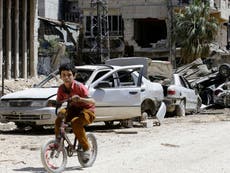
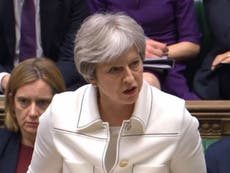
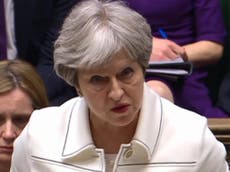
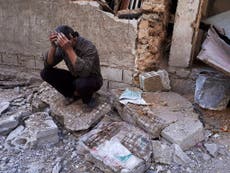
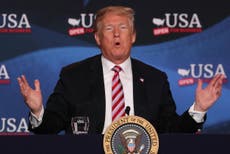
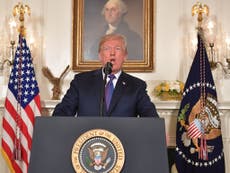
Join our commenting forum
Join thought-provoking conversations, follow other Independent readers and see their replies